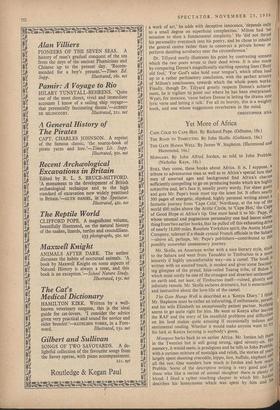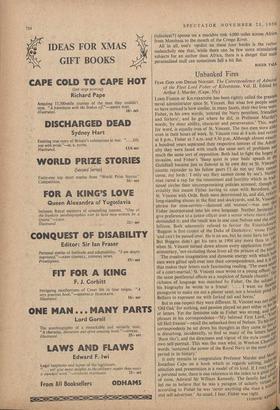Yet More of Africa
MONGASO. By John Alfred Jordan, as told to John Prebble. (Nicholas Kaye, 18s.)
STILL they come, these books about Africa. It is, I suppose, a tribute to adventurous man as well as to Africa's special lure that men of assorted ages and background find Africa's charms sufficiently compelling to go on producing books which are highlY subjective and, let's face it, usually pretty wordy. For sheer gusto and guts Mr. Pape's book must top the latest list. It offers nearly 300 pages of energetic, slipshod, highly personal writing about a fantastic journey from 'Cape Cold,' Nordkaap, at the top of the world 600 miles above the Arctic Circle, to 'Cape Hot,' the Cape, of Good Hope at Africa's tip. One must hand it to Mr: Pape, 01 whose unusual and pugnacious personality one had learnt some' thing from'two earlier books, that he pulled off this exhausting drive of nearly 18,000 miles. Resolute Yorkshire spirit, the Austin Motor Company, tolerant if a shade cynical French officials in the Sahara —above all, perhaps, Mr. Pape's publishers—contributed to this possibly somewhat unnecessary journey.
Mr. Skolle, an American writer with a nice literary style, stuck to the Sahara and went from Taoudeni to Timbuctoo in a more leisurely, if highly uncomfortable way—on a camel. The book IS written with an assured touch, is modest and gives some fascinat" ing glimpses of the proud, blue-veiled Tuareg tribe, of Bidon . which must surely be one of the strangest and dreariest settlements, on earth and, not least, of Timbuctoo itself—ruined, ghostly and infinitely remote. Mr. Skolle eschews dramatics, but is entertaining and instructive about the love-life of the camel.
The Gate Hangs Well is described as a 'Kenya Diary.' I think Mr. Stapleton must be rather an infuriating, if enthusiastic, person. and his wife Elizabeth an exceptionally patient partner. Nothing seems to go quite right for him. He went to Kenya after leaving the RAF and the story of his manifold problems and difficulties, on his land makes quite amusing if occasionally tedious and sentimental reading. Whether it would make anyone want to id his luck at Kenya farming is anybody's guess.
Mongaso harks back to an earlier Africa. Mr. Jordan left there in the Twenties but is still going strong, aged seventy-six. Os memory, it would seem, is prodigious and he tells to John Prebble' with a curious mixture of nostalgia and relish, the stories of year!, largely spent shooting crocodile, hippo, lion, buffalo, elephant aa,' all the rest. One wonders how much is Jordan and how nulePr Prebble. Some of the descriptive writing is very good and for those who like a recital of animal slaughter there is plenty Of blood. 1 liked, a rather touching chapter in which Mr. Jordae describes his honeymoon which was spent by him and III5
(reluctant?) spouse on a macabre trek 4,000 miles across Africa from Mombasa to the mouth of the Congo River. All in all, one's verdict on these four books is the rather melancholy one that, while there can be few more stimulating subjects for an author than Africa, there is a danger that such personalised stuff can sometimes fall a bit flat.
ROGER FAL14











































































 Previous page
Previous page